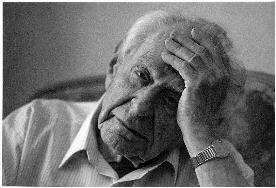

Popper was an Austrian-born British philosopher specializing in the philosophy of science and secondarily in political philosophy. In the latter sphere he particularly made a name for himself in the bourgeois world by attacking Marxism. Naturally, for this service to the ruling class, he was knighted and showered with other honors.
Popper was strongly influenced by the LOGICAL POSITIVISTS of the "Vienna Circle". (He received his Ph.D. from the University of Vienna in 1928.) His views, however, diverged from them on some points, and neither he nor his admirers liked to admit the generally close connection of his ideas to those of the widely discredited positivists.
One of the basic doctrines of the positivists was that scientific theories must be "verifiable", or in other words that they are the sorts of things which could conceivably (at least) be demonstrated to be correct by facts and evidence. Popper, however, turned this on its head: No theory can ever really be completely verified or fully proven to be correct, he claimed, and so scientific theories are those which could conceivably be "falsified" or disproved by providing counter-evidence.
Theories which are not conceivably verifiable (according to the postivists) or falsifiable (according to Popper) are merely metaphysical doctrines or pseudo-science, they assert.
Dr. Graham D. Smith, of University College, Northampton, England, sent me the following limerick that he wrote, and which sums up Popper's viewpoint here nicely:
However, Popper's doctrine of "falsifiability" has some fatal problems. It is itself a theory, and supposedly a scientific theory, and therefore it applies to itself. This means that if it is true, we can never verify that it is true! A more basic problem with it is that it fails to recognize that facts are only facts in terms of a theory. (Or, putting it another way, there is no hard line between a fact and a theory.) Therefore to adduce "facts" which falsify one theory is really to implicitly apply another theory. But how do you know that theory is true?! Moreover, this falsification doctrine is unidimensional, neglecting many other characteristics a scientific theory must possess—such as internal coherence and compatibility with other (especially broader) theories.
In short, Popper's falsification dogma is quite wrong, and easily demonstrated to be wrong. Even most bourgeois philosophers have rejected it as simplistic at best, though in the sciences (especially physics) it is still generally accepted as some kind of gospel. (You may take it as a given: scientists are always bad philosophers!)
Actually the old positivists were closer to the truth than Popper was. We can indeed sometimes prove that scientific theories are correct. (For an extensive argument on this point see my essay "Do we Know for Certain that the Earth Goes Around the Sun?") Popper, far from being "scientific", was actually a dogmatic epistemological AGNOSTIC, and thus guilty of some of the same metaphysical obscurantism that he professed to abhor.